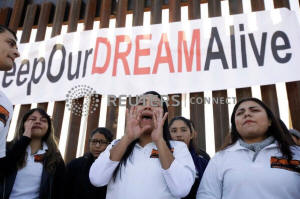|
Supreme Court to hear Trump bid to ditch
'Dreamers' immigration program
 Send a link to a friend
Send a link to a friend
 [June 29, 2019]
By Lawrence Hurley [June 29, 2019]
By Lawrence Hurley
WASHINGTON (Reuters) - The U.S. Supreme
Court on Friday agreed to decide whether President Donald Trump acted
lawfully when he moved to end a program that protects from deportation
hundreds of thousands of immigrants who were brought into the country
illegally as children, a key element of his hardline immigration
policies.
The nine justices took up the Trump administration's appeals of lower
court rulings in California, New York and the District of Columbia that
blocked as unlawful his 2017 plan to rescind the Deferred Action for
Childhood Arrivals (DACA) program implemented in 2012 by his Democratic
predecessor Barack Obama.
The program currently shields about 700,000 immigrants often called
"Dreamers," mostly Hispanic young adults, from deportation and provides
them work permits, though not a path to citizenship.
The conservative-majority Supreme Court will hear arguments and issue a
ruling during its next term, which starts in October and runs through
June 2020, meaning a decision could come in the thick of next year's
presidential race in which Trump is seeking re-election. Democratic
presidential candidates including front-runner Joe Biden have pledged
actions to protect the Dreamers and offer them citizenship.

Three federal district court judges issued orders halting Trump's move
to end DACA after lawsuits were filed by a group of states including
California and New York, people protected by the program, civil rights
groups and others challenging the legality of the Republican president's
move.
Trump, Republicans in Congress and Democratic lawmakers have been unable
to hammer out a legislative deal to protect "Dreamers." The Trump
administration has argued that Obama exceeded his constitutional powers
when he bypassed Congress and created DACA.
In the meantime, the program, in which those eligible can get renewable
two-year work permits, remains in effect for people already enrolled.
New applications are not being accepted by Trump's administration. Since
January 2018, the administration has issued more than 373,000 renewals,
according to U.S. Citizenship and Immigration Services data.
'OUR NATION'S COMMITMENT'
"DACA reflects our nation's commitment to helping hard-working people
and creates hope and opportunity for a new generation - many of whom
were brought to our country as toddlers," said California Attorney
General Xavier Becerra, a Democrat, who leads one of the legal
challenges.
"So far, both lower courts in our legal fight to protect DACA have
agreed with us that the Trump administration's attempt to end it was
unlawful," Becerra added.
Justice Department spokesman Alexei Woltornist welcomed the Supreme
Court's action. "We are pleased the Supreme Court agreed that this issue
needs resolution," Woltornist said.
The Democratic-led House of Representatives on June 4 passed a bill that
would protect "Dreamers" but the Republican-controlled Senate has shown
no sign of approving it. Dick Durbin, the No. 2 Senate Democrat, on
Friday urged the Senate to pass the legislation.
The legal question before the Supreme Court is whether the
administration properly followed a federal law called the Administrative
Procedure Act in Trump's plan to end DACA. The administration appealed
in November and the Supreme Court could have acted on it as early as
January, but delayed action for half a year before taking up the matter.
[to top of second column]
|

'Dreamers' react as they meet with relatives during the 'Keep Our
Dream Alive' binational meeting at a new section of the border wall
on the U.S.-Mexico border in Sunland Park, U.S., opposite the
Mexican city of Ciudad Juarez, Mexico, December 10, 2017. Picture
taken from the U.S side of the U.S.-Mexico border. REUTERS/Jose Luis
Gonzalez

The court's announcement came a day after it issued a 5-4 ruling on
last official day of its 2018-2019 term, dealing a major setback to
Trump's plan to add a contentious citizenship question to the 2020
census.
In another important immigration-related case, the Supreme Court
last year upheld Trump's travel ban targeting people from several
Muslim-majority countries.
Trump's effort to rescind DACA, even as he has said "I love these
kids," is part of his tough stance on immigration, which has become
a prominent feature of his presidency and his re-election campaign.
Trump has backed limits on legal and illegal immigration and has
sought construction of a wall along the U.S.-Mexican border since
taking office in January 2017.
Under Trump's September 2017 decision to rescind DACA, protections
for Dreamers were to have begun phasing out in March 2018. But lower
courts directed the administration to continue processing renewals
of existing DACA applications while the litigation was resolved.
Obama created DACA by executive action in 2012 as what he called "a
temporary stop-gap measure" after the failure in Congress of
bipartisan legislation called the Dream Act that would have provided
a path to citizenship to young immigrants brought by their parents
illegally into the country as children.
When he created DACA, Obama said the people it protected were raised
and educated in the United States, grew up as Americans in their
hearts and minds, and may know little about their countries of
origin.
The Trump administration said Trump possesses the authority to end a
program implemented by a previous president, acted lawfully in
seeking to rescind it and that courts should have no say in the
matter.
The administration sought to bypass the normal court process, filing
papers on Nov. 5 asking the high court to intervene even before some
federal appeals courts considering the matter had issued rulings.

Since then, on Nov. 8, the San Francisco-based 9th U.S. Circuit
Court of Appeals upheld District Judge William Alsup's January 2018
ruling against Trump, saying the challengers provided evidence of
"discriminatory motivation, including the rescission order's
disparate impact on Latinos and persons of Mexican heritage."
The Richmond, Virginia-based 4th U.S. Circuit Court of Appeals
subsequently ruled against Trump last month. Two federal appeals
court have yet to issue rulings.
Also among those suing the administration to preserve DACA were the
University of California, labor unions and Microsoft Corp, which
expressed concern its own employees would be affected.
(Reporting by Lawrence Hurley; Additional reporting by Richard
Cowan; Editing by Will Dunham)
[© 2019 Thomson Reuters. All rights
reserved.]
Copyright 2019 Reuters. All rights reserved. This material may not be published,
broadcast, rewritten or redistributed.
Thompson Reuters is solely responsible for this content. |